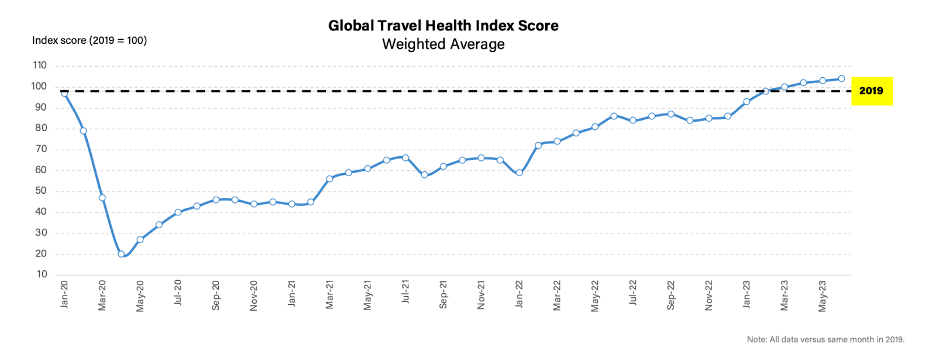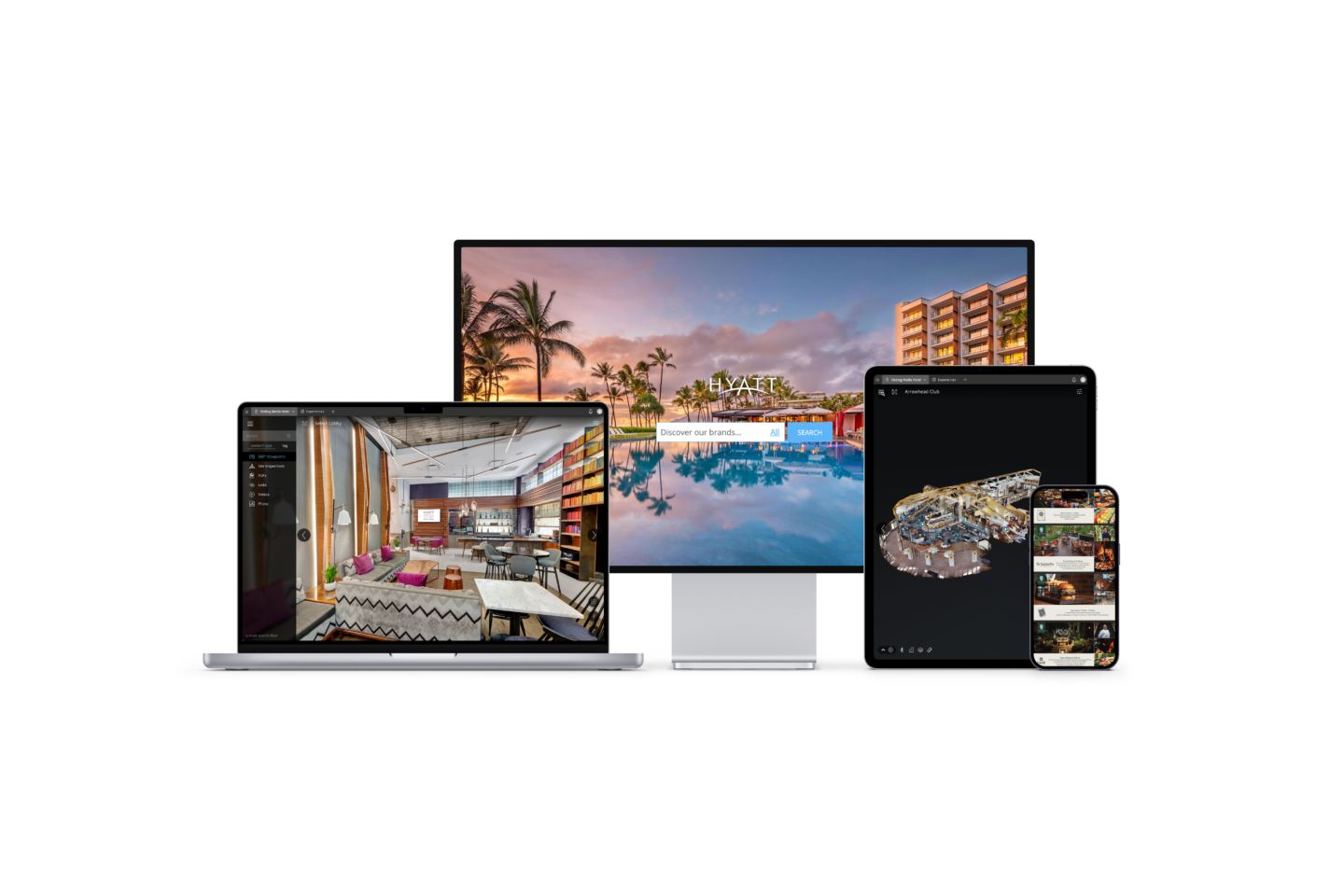Sales • Jan 3, 2024
2024 Hospitality Trends and Predictions
As the sun rises in 2024, the hospitality industry navigates a landscape profoundly shaped by the aftermath of a global pandemic. The sector is experiencing a remarkable resurgence, adapting to new norms and redefining its role in a post-pandemic world.
This recovery is highlighted in Skift Research’s Travel Health Index, showing April 2023 as the first time the global travel rebound surpassed 2019 levels (pre-pandemic). Exactly three years after its lowest point in April 2020, the industry underwent a stunning swing back.

We are pleased to report that demand for travel remains strong, maintaining the trend that we saw in the back half of last year [2022].
Chris Nassetta, CEO at Hilton (Source: Skift Research)
In this ever-evolving hospitality ecosystem, 2024 fosters a landscape marked by transformative shifts and pioneering trends. This introductory glimpse into the 2024 hospitality landscape sets the stage for exploring the market trends and strategies shaping this vibrant industry’s future.
#1 The transformation of corporate travel, alongside with the increase in “bleisure” (business + leisure)
In the wake of the global pandemic, the business travel landscape has profoundly transformed over the past few years. The traditional model of frequent individual corporate journeys has significantly changed as companies embrace remote work options. The trend reflects a higher standard and increased demand for “meetups” and “summits” where some work is just better done in person. Now, teams and departments get together more frequently for work sprints, needing space to do deep work, strategic planning, and training.
Additionally, with these corporate meetups rising in frequency, ‘bleisure’ continues to dominate. In this type of trip, team members may stay for an extended period to travel with their partners or family members to sightsee or explore more the location.
The rise of remote work overall has empowered individuals to redefine their work-life balance, offering flexibility to work from anywhere in the world. As a result, people are capitalizing on this freedom by embarking on personal travels, exploring destinations beyond their usual confines.
Consumer demand remains strong. Our middle-class customers continue to spend more on travel than they ever have, and they are staying longer than they were back in 2019, given hybrid work environment.
Geoff Ballotti, CEO at Wyndham (Source: Skift Research)
#2 Rise of Experiential Travel
In 2023, travelers searched for more than just a place to stay; they craved immersive experiences. Hotels and resorts respond by offering unique, local experiences beyond traditional amenities. These include curated city tours, hands-on workshops, or partnerships with local businesses to create a holistic guest experience. These programs, focused on ‘wellbeing,’ addressed the whole person and their immersion in the local sights, sounds and offerings one can’t find anywhere else.
#3 Tech Integration for Personalization
The integration of technology continues to shape the hospitality industry. Personalized experiences are becoming the norm, with hotels leveraging data analytics and AI to anticipate guest preferences. From automated check-ins to smart room controls, technology is enhancing convenience and providing a more tailored experience.
#4 Sustainability as a Key Differentiator
With environmental awareness rising, sustainability has significantly influenced consumer choices. Hotels are implementing eco-friendly practices, from energy-efficient facilities to reducing single-use plastics. Marketing strategies often highlight these initiatives, appealing to eco-conscious travelers.
#5 Direct Booking Incentives and Bundle Packages to Upsell
Hotels increasingly focus on driving direct bookings to reduce reliance on third-party platforms. Many establishments offer exclusive perks such as discounted rates, room upgrades, or loyalty program benefits when booking directly through their website or app to entice guests.
And to increase revenue per guest, hotels are adopting bundle packages that include accommodation, dining, and recreational activities. Upselling strategies involve offering upgrades, spa packages, or other add-ons during the booking process or check-in.
In Conclusion
In 2024, the hospitality industry is navigating a dynamic landscape shaped by changing consumer expectations and technological advancements. To stay competitive, hotels must embrace experiential travel, leverage technology for personalization, and adopt innovative sales and marketing tactics. By staying ahead of these trends, the hospitality sector can continue to provide memorable experiences for guests and thrive in the evolving market.
Visiting Media Helps Hotels Deliver Dynamic Experiences™ With The World’s Only Hospitality Sales Enablement Tool
From the need to meet the team in person to the desire to explore a new location on an extended stay, consumers are looking for these unique moments. Hotels should work diligently to offer the best user experience, including experiential and immersive offers.
In this fast and competitive environment, sales and marketing teams use all sorts of assets and tools to boost revenue and beat the competition. They often face the challenge of working with unorganized and outdated assets, needing help to fully immerse their prospects and customers into their property and surroundings, whether to win a new proposal or maximize their revenue per customer.
As the only sales enablement software seamlessly handling advanced immersive technologies, our goal is to provide an unparalleled competitive advantage to our customers by redefining how assets are managed and distributed across various channels. Click here to learn more about Visiting Media’s sales enablement software.
Sales • Jan 3, 2024
2024 Hospitality Trends and Predictions
As the sun rises in 2024, the hospitality industry navigates a landscape profoundly shaped by the aftermath of a global pandemic. The sector is experiencing a remarkable resurgence, adapting to new norms and redefining its role in a post-pandemic world.
This recovery is highlighted in Skift Research’s Travel Health Index, showing April 2023 as the first time the global travel rebound surpassed 2019 levels (pre-pandemic). Exactly three years after its lowest point in April 2020, the industry underwent a stunning swing back.

We are pleased to report that demand for travel remains strong, maintaining the trend that we saw in the back half of last year [2022].
Chris Nassetta, CEO at Hilton (Source: Skift Research)
In this ever-evolving hospitality ecosystem, 2024 fosters a landscape marked by transformative shifts and pioneering trends. This introductory glimpse into the 2024 hospitality landscape sets the stage for exploring the market trends and strategies shaping this vibrant industry’s future.
#1 The transformation of corporate travel, alongside with the increase in “bleisure” (business + leisure)
In the wake of the global pandemic, the business travel landscape has profoundly transformed over the past few years. The traditional model of frequent individual corporate journeys has significantly changed as companies embrace remote work options. The trend reflects a higher standard and increased demand for “meetups” and “summits” where some work is just better done in person. Now, teams and departments get together more frequently for work sprints, needing space to do deep work, strategic planning, and training.
Additionally, with these corporate meetups rising in frequency, ‘bleisure’ continues to dominate. In this type of trip, team members may stay for an extended period to travel with their partners or family members to sightsee or explore more the location.
The rise of remote work overall has empowered individuals to redefine their work-life balance, offering flexibility to work from anywhere in the world. As a result, people are capitalizing on this freedom by embarking on personal travels, exploring destinations beyond their usual confines.
Consumer demand remains strong. Our middle-class customers continue to spend more on travel than they ever have, and they are staying longer than they were back in 2019, given hybrid work environment.
Geoff Ballotti, CEO at Wyndham (Source: Skift Research)
#2 Rise of Experiential Travel
In 2023, travelers searched for more than just a place to stay; they craved immersive experiences. Hotels and resorts respond by offering unique, local experiences beyond traditional amenities. These include curated city tours, hands-on workshops, or partnerships with local businesses to create a holistic guest experience. These programs, focused on ‘wellbeing,’ addressed the whole person and their immersion in the local sights, sounds and offerings one can’t find anywhere else.
#3 Tech Integration for Personalization
The integration of technology continues to shape the hospitality industry. Personalized experiences are becoming the norm, with hotels leveraging data analytics and AI to anticipate guest preferences. From automated check-ins to smart room controls, technology is enhancing convenience and providing a more tailored experience.
#4 Sustainability as a Key Differentiator
With environmental awareness rising, sustainability has significantly influenced consumer choices. Hotels are implementing eco-friendly practices, from energy-efficient facilities to reducing single-use plastics. Marketing strategies often highlight these initiatives, appealing to eco-conscious travelers.
#5 Direct Booking Incentives and Bundle Packages to Upsell
Hotels increasingly focus on driving direct bookings to reduce reliance on third-party platforms. Many establishments offer exclusive perks such as discounted rates, room upgrades, or loyalty program benefits when booking directly through their website or app to entice guests.
And to increase revenue per guest, hotels are adopting bundle packages that include accommodation, dining, and recreational activities. Upselling strategies involve offering upgrades, spa packages, or other add-ons during the booking process or check-in.
In Conclusion
In 2024, the hospitality industry is navigating a dynamic landscape shaped by changing consumer expectations and technological advancements. To stay competitive, hotels must embrace experiential travel, leverage technology for personalization, and adopt innovative sales and marketing tactics. By staying ahead of these trends, the hospitality sector can continue to provide memorable experiences for guests and thrive in the evolving market.
Visiting Media Helps Hotels Deliver Dynamic Experiences™ With The World’s Only Hospitality Sales Enablement Tool
From the need to meet the team in person to the desire to explore a new location on an extended stay, consumers are looking for these unique moments. Hotels should work diligently to offer the best user experience, including experiential and immersive offers.
In this fast and competitive environment, sales and marketing teams use all sorts of assets and tools to boost revenue and beat the competition. They often face the challenge of working with unorganized and outdated assets, needing help to fully immerse their prospects and customers into their property and surroundings, whether to win a new proposal or maximize their revenue per customer.
As the only sales enablement software seamlessly handling advanced immersive technologies, our goal is to provide an unparalleled competitive advantage to our customers by redefining how assets are managed and distributed across various channels. Click here to learn more about Visiting Media’s sales enablement software.

